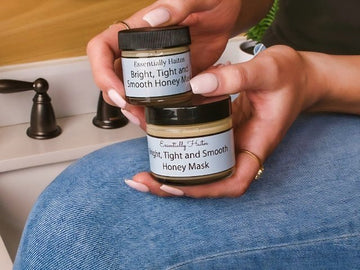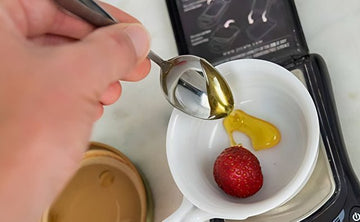What a disaster 2020 has been! You hear it wherever you go (if you’re “allowed” to go anywhere). It’s normal to feel overwhelmed and stressed when so much is out of our control – on top of all the self-imposed Holiday stress. Thank Goodness 2020 is almost over, right? Unfortunately, it’s not going to magically turn around on January 1, 2021.
At this point, it’s crucial to our mental health to control what we can – and to calm the heck down. And…what we can control are our habits, behavior and surroundings.
Our lives are clogged with toxins — and not just the kinds we put into our mouths.
You probably already know that clean-eating or banning added sugar and processed food can help rejuvenate your body and help you lose a few pounds. That’s a topic for another day – but…today is the day to eliminate some other things that can create stress and negativity in your life.
“It’s always helpful to remove a substance from your life for a short period and notice its effect on both your mind and your body,” says Susie Moore, a New York-based life coach.
If you’re ready to work on boosting your happiness and slashing stress, consider a feel-good detox plan and see how much better you feel!
- Detox From: Negativity

It’s easy to focus on everything that’s going wrong in your life. But when you’re constantly complaining, you get trapped in a never-good-enough mindset, says Colene Elridge, a life coach in Kentucky.
“It’s your thoughts, not your circumstances, that shape your life. Negative thoughts equal a negative life, plain and simple,” she says. A study in the Journal of Personality and Social Psychology finds that people who practice a loving-kindness mediation see an increase in positive emotions, such as love, joy, gratitude, pride, amusement. In turn, this enables people to become more satisfied with their lives.
Being a Debby Downer may be keeping you from sticking with daily workouts and healthy meals, too. “You’ll have a hard time reaching your fitness goals if you are constantly beating yourself up emotionally,” Elridge says. “You will never find motivation in a negative mindset.”
How to do it
Cut negative influences: Are you always consuming doom-and-gloom content? Are you surrounded by Energy Vampires? Avoid these poor influences. “It’s really hard to change your negative energy if you’re constantly consuming negative energy,” Elridge points out.
Start small: “Most change isn’t successful because people try to bite off too much,” says Elridge. Start with one hour of positivity a day, she suggests. Consciously offer no negative thoughts, words, or actions and see how that changes your perspective and energy. Then, try it for a day. Eventually it may become your natural outlook.
Start a gratitude journal: It sounds a little cheesy but writing down what you’re grateful for can help shift how you think. At the beginning or end of each day, write down three things you’re thankful for. “It literally takes less than five minutes, and it can completely change your mindset,” says Eldridge.
- Detox From: Clutter

Too much stuff in your line of sight limits your ability to think clearly, Moore says. Indeed, research from Princeton University says just seeing clutter affects your ability to process information compared to being in an organized environment, which can lead to more stress and exhaustion.
“Less is easier to manage, so fewer things of good quality can result in energetic ease and clarity,” says Moore.
How to do it
Block off an afternoon to clean house: Moore suggests tackling all the physical chaos in your life at once — commit to a morning or afternoon of organization and get it all done at once.
Start small: Begin with a small room, bathroom, or closet, Elridge suggests. Tidying up small spaces will help you quickly see results and build momentum.
Be ruthless: Elridge suggests taking a page out of Marie Kondo’s famed book, The Life-Changing Magic of Tidying Up. Hold every item and ask, “Does this bring me joy?” If the answer is no, toss it. “I like the process of being very intentional with every single item you have in your space,” Elridge says.
- Detox From: Negative Social Media

Yes, social media can have a positive impact on your life and health. “Social media is a means of making social connections, which research shows has a positive impact on our emotions and sense of well-being,” says Pamela Rutledge, Ph.D., director of the Media Psychology Research Center.
But if scrolling through Instagram makes you compare yourself with others in unrealistic ways — like body shape and spur of the moment vacations to Bali — that will likely zap positivity and confidence from your life. In fact, a study from Flinders University in Australia found people who use social networking sites more frequently than others are more likely to have body image issues and eating disorders.
But, when people took a week off Facebook and Instagram, they were happier, more satisfied with their lives, and less envious of others compared with peers who logged on lightly, according to a 1,095-participant study in the journal Cyberpsychology, Behaviour and Social Networking.
The stress induced from social media can cause you to wear out emotionally, leaving you with less energy to stick with your fitness goals or resist temptations, says Rutledge. That’s why a social media detox can be beneficial.
How to do it
Do a stress audit: Not all apps are bad — many help cultivate mindfulness by strengthening your meditation practice, or help you stay fit with top-notch workouts. To separate the good from bad, Rutledge suggests evaluating your favorite platforms to determine which are relaxing and uplifting, and which are sources of stress and anxiety. Take a week or two off from the latter.
Time it wisely: It’s almost impossible to completely cut yourself off from technology. We often need to stay connected for jobs, friends, and family. Evaluate when an appropriate time to unplug might be, so you don’t cause yourself more stress in the process.
Get away: “If you go cold turkey in your normal environment, the act of unplugging can be more stressful than helpful because you will have many built-in habits that you’ll have to counteract,” says Rutledge. Here’s an awesome solution: take a weekend retreat or plan a vacation filled with activities and unplug for the trip.
- Detox From: Makeup
 Our skin needs time without clogged pores so it can breathe, says Karen Haitos, founder of organic skin care company Essentially Haitos (haha – that’s me!). And as a bonus, healthier skin can often lead to higher self-confidence!
Our skin needs time without clogged pores so it can breathe, says Karen Haitos, founder of organic skin care company Essentially Haitos (haha – that’s me!). And as a bonus, healthier skin can often lead to higher self-confidence!
A study in Environmental Health Perspective found that when teen girls took a break from their usual daily makeup, urine tests reported lower levels of chemicals in their body, some of which have been proven to interfere with the body’s endocrine system. That’s important, because the endocrine system is responsible for regulating hormones that, in part, regulate weight gain and fat burn.
If just thinking of showing your naked face in public makes you want to stay inside, conquering this fear can help you learn to push your limits in life.
Going makeup-free, if you’re used to wearing it daily, can be like the dream where you’re naked and everybody else is fully clothed – a bit uncomfortable, but then you realize nobody notices (or at least says anything). Very freeing!
How to do it
Take whatever break you can: Ideally, the longer the better, but there’s no detox too short. Take a break from just the evening until the next morning is a good starting point (and please don’t tell me you sleep with make-up on!).
Track changes: Pay attention to what’s happening on the surface when you’re not applying coverup, and, more importantly, what happens when you reintroduce makeup. Does your face break out your first day back on makeup? If so, investigate what’s in your beauty products and consider a natural / organic alternative.
Moisturize: When detoxifying from makeup, use a nice, simple oil or serum for moisturizing and rejuvenating the skin. The cleaner, the better. If you want to go really simple, coconut oil is an excellent face and skin moisturizer, deep cleanser, antibacterial shield, and natural sunscreen.
- Detox From: The News
 “Humans have a tendency to be drawn to disasters as part of our biological drive for safety,” says Rutledge. “We can’t help ‘rubbernecking’ over crises to determine our own risk subconsciously.”
“Humans have a tendency to be drawn to disasters as part of our biological drive for safety,” says Rutledge. “We can’t help ‘rubbernecking’ over crises to determine our own risk subconsciously.”
But continually watching negative news can make people feel like the world is scarier and more dangerous than it really is. This frame of mind can transfer to how we interpret all kinds of things, not just the news. In fact, watching just three minutes of negative news in the morning made people 27 percent more likely to be unhappy later in the day, according to Harvard Business Review.
While it’s important to stay informed, constantly watching disaster and devastation only adds stress and negativity to your life. (Covid 19, anybody?)
Detox Plan
Be mindful: Mindfulness is the key to all of this, says Rutledge. “Pay attention to what you are consuming, why, and how it makes you feel,” she says. If you find that listening to the news first thing in the morning spikes your stress levels, or disrupts your sleep right before bed, tune into something more positive at these vulnerable times.
Listen to reputable sources: Avoid Facebook, Twitter and similar news feeds as your primary news source. These tend to promote sensationalized (and sometimes inaccurate) stories. (Have you heard the term “fake news” recently?) Instead, do your own research and get your news from reputable, trustworthy sources.
Read happy news stories: Balance negative news with happy news. “Seek out something that makes you laugh or happy or is inspirational — this changes your body chemistry and offsets some of the effects of stress,” says Rutledge. You can even switch to happy news networks, like Good News Network, or check out the “Good News” sections of various sites.
- Detox From: The Indoors
 Most of us would rather be outside than inside. But it turns out, we also really need to be surrounded by nature.
Most of us would rather be outside than inside. But it turns out, we also really need to be surrounded by nature.
Studies show that when people are around trees and greenery, indicators of cardiovascular health improve, and they are less anxious than when they’re surrounded by concrete and manmade structures.
If you live in the country, this may be little problem. But for the millions of city dwellers trying to get healthy, getting into the woods can provide a huge boost.
How to do it
Purchase plants: Adding greenery to an indoor space can help it feel more like the outdoors. “Spending time around natural scenes and elements, even indoor plants and windows, seem to be a vitality booster,” says Richard M. Ryan, Ph.D., research professor in psychology at the University of Rochester, who has studied nature’s effect on our bodies and minds.
If you don’t exactly have a green thumb, consider buying one of these houseplants that are super easy to take care of.
Take a walk: “Of course a weekend in the country is great, but even sitting under a tree can revitalize you,” says Ryan. Better yet, a 20-minute walk near greenery can reduce more stress than walking through a city center, according to research in the Journal of Environmental Psychology.
Take your workout outdoors: Working up a sweat outside may actually help you get a better burn. People tend to walk faster when outdoors compared to indoors — and feel like they’ve exerted less energy, says a review in Extreme Physiology and Medicine.
In Summary – throw out the negativity in your life (whether it’s people, social media, news), let your skin breathe, reduce clutter in your environment and enjoy a few minutes each day with Mother Nature. Now, wasn’t that easy?







